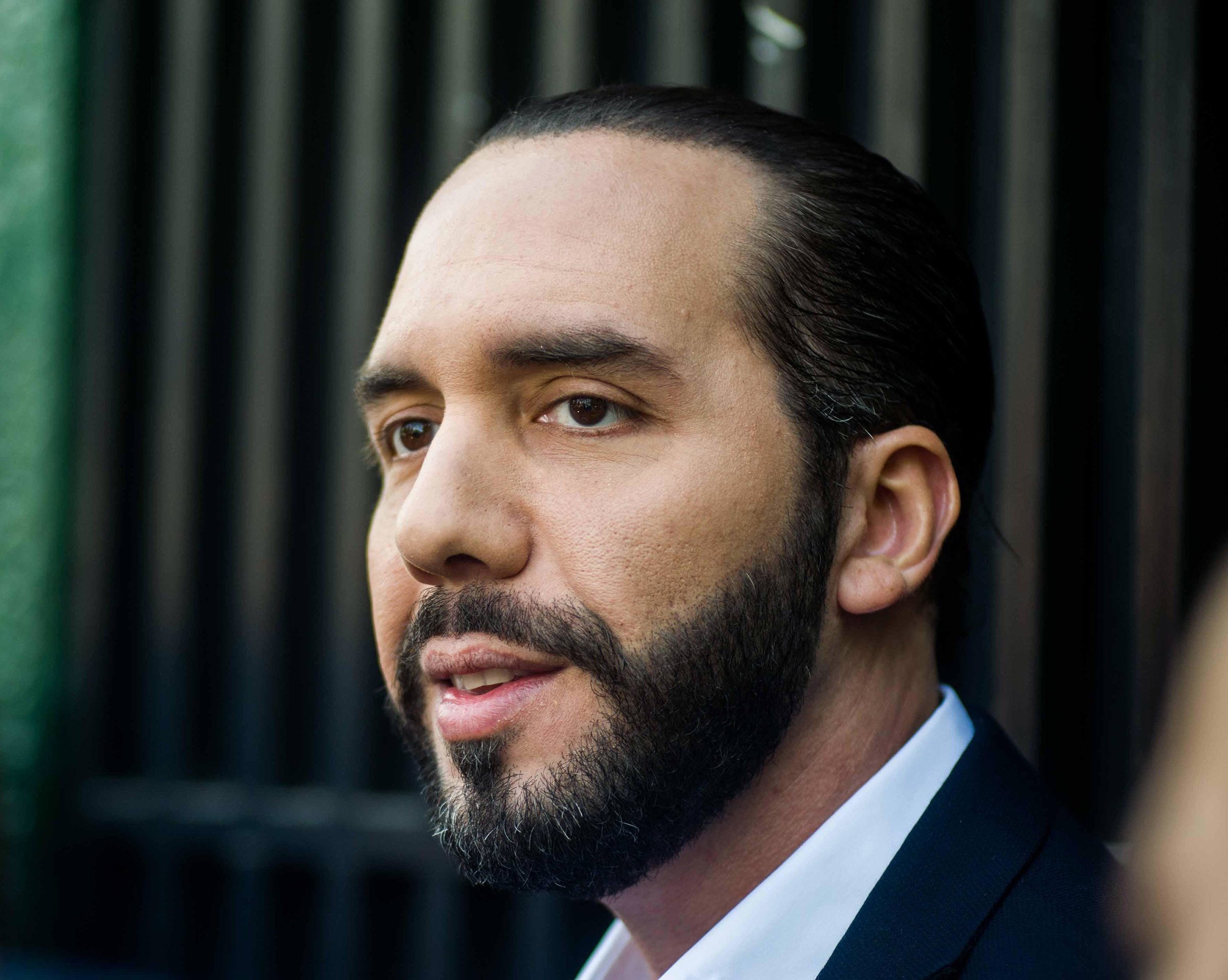Get the weekly summary of crypto market analysis, news, and forecasts! This Week’s Summary The crypto market ends the week at a total market capitalization of $2,17 trillion. Bitcoin continues to trade at around $62,300. Ethereum experiences no changes and stagnates at around $2,400. XRP is down by 2%, Solana by 1%, and Dogecoin by 3%. Almost all altcoins are trading in the red, with very few exceptions. The DeFi sector decreased the total value of protocols (TVL) to around…
Vitalik is Wrong About Bukele’s Bitcoin Mandate
Ethereum’s founder just called The Bitcoin Law “reckless” and opposed to freedom. But it’s the most practical way forward for the well-being of El Salvador.
The Article 7 Controversy
On June 9th, 2021, El Salvador made world history by passing a digital currency, Bitcoin, as legal tender alongside the US Dollar. President Nayib Bukele and Strike developer Jack Mallers announced the law at the twelve thousand-person Bitcoin conference. The crowd received the news with thunderous applause, and congress cast an overwhelming 62/84 votes favoring its mandate.

Nevertheless, the Bitcoin law also had its fierce critics. These included the usual suspects such as Steve Hanke, JP Morgan, and The World Bank.
However, other critics came directly from the cryptocurrency and Bitcoin communities. Many reconsidered their support after reading its now noteworthy stipulation: Article 7.
Every economic agent must accept bitcoin as payment when offered to him by whoever acquires a good or service.
This isn’t what many thought “legal tender” entailed, including Coinmetrics co-founder and Bitcoin supporter Nick Carter. Most legal tender laws make payment with a specific medium acceptable but not mandatory.
Optics Concerns
Nevertheless, the law contains other details which minimize any oppressive elements of Article 7.
Article 8 confirmed that businesses could opt for instant and automatic conversion of payments from Bitcoin to USD. Furthermore, it promises the “necessary training and mechanisms” to make Bitcoin payments accessible for the population. Finally, Article 12 states that the law will not force BTC use on businesses lacking the technological capability to accept Bitcoin.
However, Carter still insisted that Article 7 be revised or eliminated due to its “poor optics.”
This brings us to last week when the same criticism about ‘optics’ re-emerged on r/CryptoCurrency by user Acceptable_Novel8200. He wrote a post titled “Unpopular opinion: El Salvador President Mr. Nayab Bukele should not be praised by Crypto community.”
In a few paragraphs, he criticizes some of Bukele’s reported crimes unrelated to the Bitcoin law. These include storming the legislative assembly with armed troops and packing the Supreme Court with his loyalists. In conclusion, he says the crypto community should distance themselves from Bukele before he gives them a “bad name.”
On its own, the anonymous user’s post may not have garnered much traction. However, it soon weighted the leading altcoin’s figurehead behind it: Vitalik Buterin.
Vitalik Opposes The Bitcoin Law
In what is now the most upvoted response to the thread, Vitalik reaffirms the OP’s opinion on the matter. What’s more, he adds that Bitcoin’s mandated acceptance is antithetical to all of crypto.
Nothing unpopular about this opinion. Making it mandatory for businesses to accept a specific cryptocurrency is contrary to the ideals of freedom that are supposed to be so important to the crypto space.

The infamous programmer calls the law “reckless” for featuring “almost no attempt at prior education” before implementation. Also, he cited concerns of people being “hacked” or “scammed.” Lastly, Vitalik finished by calling “shame” on Bitcoin maximalists for “uncritically praising [Bukele].”
The OP quickly leaped on Vitalik’s supportive comment, and the two hypothesized that Bukele has an ulterior motive. Unfortunately, Vitalik’s follow-up gets extra derisive of Bitcoiners:
Both for political reasons and because he’s a human being like the rest of us, [Bukele] just loves being praised by people he considers powerful (i.e. Americans). Bitcoin maximalists are a very easy community to get to praise you: you just have to be in a position of power and do or say nice things about them and their coin.
There’s a lot to unpack in Vitalik and others’ criticisms of Bukele, his law, and Bitcoin maximalists. Like most ideas, their words harbor some validity. Yet, they also struggle with misunderstanding, blatant hypocrisy, and a failure to focus on the bigger picture.
Yet, that’s what we can expect from someone in Vitalik’s position. If anything, his recent comments let the mask slip regarding where his priorities are.
I want to remind everyone why Bukele’s law– Article 7 included– is worthy of praise. But first, let’s talk about why Vitalik is the last person who should be virtue signaling over it on Reddit.
Hypocrisy: Bitcoin vs. Ethereum
It’s laughable that Vitalik would claim “freedom” as something prioritized by the broader “crypto” community. Meanwhile, he calls “shame” specifically upon Bitcoiners for apparently forgetting this fact.
Has he forgotten that Bitcoin was developed from a purely altruistic motivation to disrupt centralized money? Its creator abandoned the project and left more than 1 million Bitcoin on the table to make that a reality? Or that the Bitcoin community has successfully warded off two-block size changes that would sacrifice the network’s decentralization?

It was only after this devoted group built Bitcoin into a globally recognized “cryptocurrency” that others bloomed in its place. Yet unlike Bitcoin, these follow-ups almost always required an influential, centralized marketing team to get started. They also typically featured a massive token pre-mine with which it unfairly rewarded early developers.
One of these networks was Ethereum, which Vitalik abandoned Bitcoin to begin his work on.
No matter how one may twist it, Vitalik still exercises enormous influence on the direction of Ethereum. Unlike Bitcoin, he and a small group of miners control the network’s upgrades rather than the network nodes. Furthermore, Vitalik’s pre-mined Ethereum funds put his net worth at over $1 billion.
This is indeed not conducive to the ‘freedom’ that Vitalik and the ‘crypto’ space purportedly stand for.
Funnier still is how Vitalik suddenly shows concern for people getting “hacked” or “scammed” due to Bukele’s fast legal implementation. Yet, again, he appears to have no issue spearheading the Ethereum platform that’s supported some of the worst ICO scams and Defi hacks in history.
Vitalik is a Sore Loser
Upon closer examination, neither of Vitalik’s criticisms hold any merit. Firstly, he fails to mention Article 8 of the law in his criticism, which allows for automatic BTC-USD conversions. Also, Bukele provided help for those who needed guidance on using Bitcoin and the Chivo Bitcoin wallet.
The hypocrisy, misleading statements, and condescending tone Vitalik uses are signs that he’s not arguing from a good place. The Ethereum poster-child knows exactly how monumental a development El Salvador’s law is for Bitcoin. But, more importantly, he knows it’s a sign that Bitcoin is leaving Ethereum in the dust.
Bitcoin’s adoption continues to surge– as does its market dominance. Meanwhile, all Vitalik can do is “shame” Bitcoin maximalists with irrelevant purity testing and guilt-by-association.
Reminder: Bitcoin is For Our Enemies
What bitcoin maximalists aspire for is the worldwide adoption of an open and accessible monetary network. Therefore, they are fully committed to growing the network between all people.
As Vitalik says, maximalists “uncritically praise” anyone that supports Bitcoin, showering them with encouragement. As he would imply, this shows unthinking loyalty towards anyone that tells Bitcoiners what they want to hear.
However, maximalists’ fervor for Bitcoin supporters is a feature of their philosophy– not a bug. They are ignorant of peripheral details surrounding Bukele (like his political track record) because they don’t care about it. That’s precisely the point.
Bitcoin is for our enemies. That’s what neutral, censorship-resistant money entails. It doesn’t matter if you’re left-wing, right-wing, authoritarian, or libertarian. Everyone deserves access to the network, control of their funds, and a reliable store of value.
If Bukele is part of a global effort to recognize Bitcoin as currency, he is an ally in that regard. Moreover, what he is doing with Bitcoin will bring tremendous, tangible benefits to his people.
I know nothing of Bukele’s character. I don’t understand El Salvador’s history or internal politics. These are problems worth addressing by other people at another time. At the moment, however, we shouldn’t be interrupting someone in the middle of doing a good thing.
In the end, Vitalik can and will continue to nitpick about Bukele’s ‘optics’ and his victimless legal stipulation. Meanwhile, the Salvadoran president will be busy using Bitcoin to solve actual problems.
Not Just A Game
The most laughable part of Vitalik’s recent comments is his theory about why Bukele is such a vocal Bitcoiner. The president must love to be praised by Americans and knew those unenlightened Bitcoiners could be easily manipulated.
Indeed, that must be why Bukele would willingly invite heated protests from his citizenry. It’s also why he’d draw attention to himself as a terrible dictator from global media. Just for the optics, indeed!
Vitalik admits this is a stupid theory, but it doesn’t come across as a joke either. It really would seem that, in his mind, Bukele might only take such a drastic step as a publicity stunt. This is precisely the type of logic one might expect from Vitalik. He’s a young, billionaire intellectual from a developed country who doesn’t have problems larger than his public image.
Is it possible, though, that Salvadorans might face more significant problems than that? Problems that The Bitcoin Law may help to solve?
The Plight of El Salvador
Here are some facts about the well-being of El Salvador:
- The country’s population is about 6.5 million
- GDP is under $25B. GDP per capita is about $3600.
- 22.3% of the population was in poverty in 2019. That means making less than $5.5USD per day.
- Growth per capita has been prolonged and even slowed by 8% in 2020.
- Salvadoran adult literacy is 79% for men and 73% for women
- Only a third of Salvadoran children old enough for secondary school attend it.

In short: Salvadorans are broke. But, perhaps, more importantly, they lack education on it, too.
The local experience in El Salvador is even worse once we realize that much of their income is from abroad. The country received $6B in remittances in 2020– about a third of their GDP. But, as the president estimates, the country loses about $400M of these remittances in commissions payments to Western Union and centralized institutions. Around 70% of the population receives remittances, and consequently, must face these charges.
But that’s where Bitcoin comes in.
How Bitcoin Helps El Salvador
Salvadorans can now receive non-intermediated Bitcoin or fiat payments from abroad using Bitcoin’s second-layer lightning network as a payment rail. That means near zero-fee remittance payments. This would save the average Salvadoran a substantial amount of money by simply using the Bitcoin network.
For this specific reason, a Tongan MP wants to make Bitcoin legal tender in his country. Tonga is the world’s most remittance-dependent country on earth and sees 10%+ GDP lost in fees each year.
The commonly cited benefits of Bitcoin adoption include immediate settlement, long-distance transfers, and fixed supply. Its fixed supply, in particular, makes it an effective store of value for a country trying to build long-term wealth. For instance, Bitcoin’s value was $1200 at its peak in 2013. Now it’s $57 000.
So Bitcoin provides a tool for virtually free remittances, efficient transactions, and value storage/ investment. But why mandate its acceptance? If Bitcoin is genuinely a superior currency, won’t El Salvadorans naturally adopt it without coercion?
The answer is yes. However, it would take too long.
Why El Salvador Needs The Bitcoin Law
As mentioned, El Salvador’s population is far less educated than those of developed countries. Even in wealthy countries, most people are still totally ignorant about Bitcoin and its utility. For example, a recent poll found that over 50% believe that Elon Musk invented Bitcoin in Australia.
In this light, one can only imagine the disconnect present in El Salvador regarding cryptocurrency. Days before the law took effect, protestors still opposed Bitcoin for facilitating criminal activity, which is a myth.

Furthermore, a UCA poll revealed that 9/10 people did not even clearly understand Bitcoin. Again, 80% had “little or no confidence” in its use, despite being the most secure payment network in history.
Ultimately, two facts are apparent.
- El Salvador stands to gain tremendously from Bitcoin– especially if the nation’s people adopt it early.
- Most of the nation isn’t aware of how beneficial it is due to misunderstanding.
Under these conditions, the population could take many years to start understanding and adopting Bitcoin independently. Meanwhile, Bitcoin’s price would continue to rise, and the nation would continue losing billions in remittance fees for no reason.
For a leader interested in his country’s well-being, it is in Bukele’s best interest to incentivize Bitcoin adoption as quickly as possible. One way in which he is going about this is with Article 7: mandatory acceptance for payment.
At a minimum, this would require that all businesses download the Chivo wallet and become familiar with transacting in Bitcoin. This is precisely the point of such a stipulation. Even if companies don’t want to store their value in it, they must understand the technology.
The Bitcoin Law: Final Verdict
Is this coercive? Yes. Is it somewhat contradictory to Bitcoin’s opposition to fiat currency? Yes.
But this is the real world. Sometimes, leaders must lead– especially in small countries that need a way out of poverty. As a tech-savvy leader, it would be irresponsible for Bukele to stand by as Bitcoin’s price and capabilities flourish. So he’s taking the initiative, even if at the minor inconvenience of the population.
Ultimately, the mandate is for their good, and Salvadorans are already starting to realize that. El Salvador’s purchase of over 700 Bitcoin is already well into the green despite a rocky first month. The profits from it are being used to build a pet hospital.
As Bitcoin’s price rises, people will start to accept hard Bitcoin for payment rather than converting it into dollars immediately. The benefits of Bitcoin as a store of value will naturally make sense. At this point, accepting Bitcoin will feel like a personal choice, and people will feel inclined to HODL on their own.
However, Bukele’s law is the initial kickstart the population needs to build infrastructure and grow awareness around Bitcoin acceptance. This way, they will start exploiting Bitcoin’s benefits far sooner than they would have otherwise.
In conclusion, Bukele’s Bitcoin mandate is, technically, “contrary to freedom,” as Vitalik suggests– but in a practically irrelevant way. The real world, long-term benefits that the mandate will provide the population substantially outweigh the cost of implementing it. Vitalik can keep his salty tears to himself.
How Users Earn Cryptocurrency with Instars.com
Bored Ape Yacht Club Just Signed With Madonna’s Talent Manager
Written by
More author posts
Publish your own article
Guest post article. Guaranteed publishing with just a few clicks
START PUBLISHING ADVERTISE WITH US





